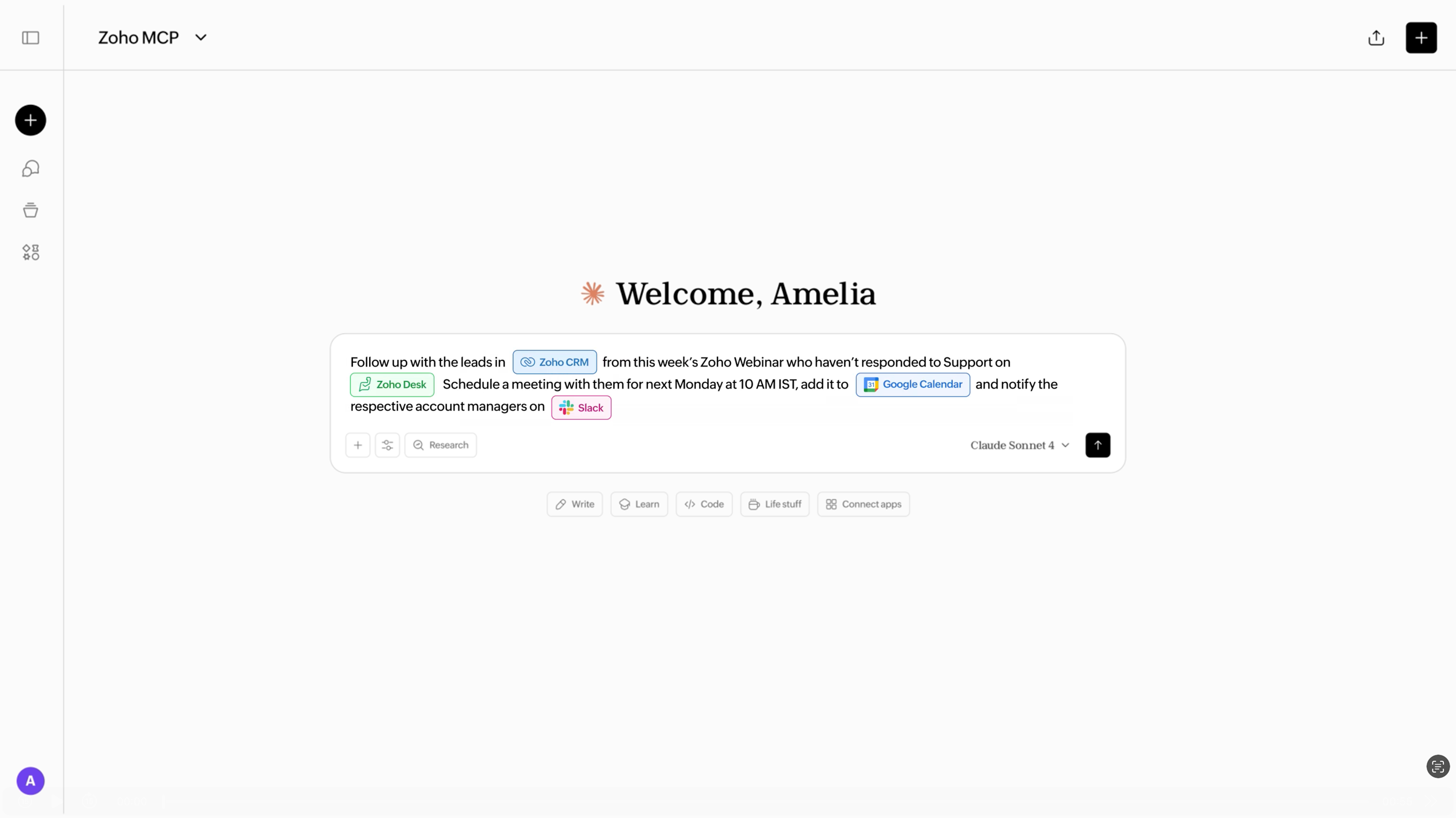For decades, business apps have made users and
That ends now
Meet Zoho MCP (Model Context Protocol), which enables developers to instantly transform business apps into intelligent, agent-ready systems—systems that think, act, and respond like a teammate, not just a tool.
It connects LLMs like GPT or Claude to Zoho’s APIs, data models, and actions, so agents gain the context, access, and control they need to turn natural instructions into real actions across your business apps.
Work won’t happen in tabs anymore. It’ll happen through agents.
Not just another product, Zoho MCP redefines how Al agents integrate with business apps to help you empower your teams to work faster, smarter, and friction-free by letting agents handle what used to take clicks.
The old way
- Manual clicks.
- Forms. Menus. Tabs.
- Your apps demand you adapt to them.
The Zoho MCP way
- Natural language prompts.
- Multi-app execution via a single agent.
- API-native, agent-driven workflows.
Autonomous by design
Zoho MCP isn’t just for chat-based prompts. It can also be used by autonomous agents. That means you don’t have to prompt explicitly. It enables fully autonomous agents to monitor, reason, and act without human input.
Some examples:
- Auto-escalating unresolved support tickets overnight
- Monitoring deal progress and reassigning accounts
- Launching reports or alerts when anomalies are detected
Whether the instruction comes from a user or the agent itself, Zoho MCP translates intent into action across your Zoho apps.
Run these real-world prompts
Here are some sample prompts for you to try in the playground.
- Sales
- Marketing
- Support
- Finance
Sales
Prompt: “Mark the Zylker deal as won and schedule a call with John for an onboarding meeting”
Auto-update deals, trigger follow-ups, and log meetings.
Marketing
Prompt: “Schedule a campaign called ‘Summer Sale Blast’ for next Tuesday at 11 AM and target all leads from Bangalore.”
Generate campaign reports, launch workflows, optimize content
Support
Prompt: “Search the desk for any open tickets. Mark them as in progress and send a reply that we are working on it and will update by end of the day”
Escalate tickets, summarize threads, and auto-assign queries
Finance
Prompt: “Generate an invoice for Naveen Kumar from ABC Corp for ₹1200 on consulting services”
Generate invoices, track payments, log expenses, and create financial reports.
300+ integrations
at your fingertips across Slack, Gmail, Zoho, and beyond.
Give your AI agents real-world powers.
Made for developers. Loved by agents.
MCP standardizes how AI agents interact with Zoho applications.

Works with all LLMs
Compatible with Claude, GPT, and other AI agents right out of the box.
Built-in playground
Test your integrations without writing code.
Schema-first design
Self-describing APIs with clear input/output contracts.
Unified interface
Consistent patterns across all Zoho applications.
Drop-in compatible
Works immediately with agent frameworks and tools.

Secure, permission-scoped
OAuth-based authorization ensures proper access control.
How it works
MCP provides a standardized way for AI Agents to interact with Zoho applications
Step 1: Agent prompt
The AI agent sends a user request.
Create a lead with an email as emma@zylker.com
Step 2: Context gathering
Agents fetch the relevant content.
{"Module": "Leads",
"instructions": "Create a new lead with email
address emma@zylker.com. Please set the email
as the primary contact method."
}
Step 3: MCP tool execution
Agents call the right tool.
{"url": "https://www.zohoapis.com/crm/v2/Leads",
"body": "{\"data\":[{\"Email\":\"emma@zylker.com\",\"Last_Name\":\"\",\"First_Name\":\"Emma\"}]}",
"method": "POST",
"instructions": "Create a new lead in Zoho CRM with email address emma@zylker.com. Use the standard layout and include the email as the primary contact method."
}
Step 4: MCP tool response
The tools return a success/failure response.
{"data":
{"status_code":"Success",
"message":"Lead Created Successfully",
"lead_id":"10000000000022"
}
}
FAQ
- Product Understanding
- Technical
- Business Impact
- Access & Security
- Integration & Compatibility
Product Understanding
Zoho MCP is a product built around the Model Context Protocol (MCP), a standardized interface that allows AI agents to interact with business software. With Zoho MCP, you can create MCP Servers that expose tools, actions, and contextual data from Zoho apps in a way AI agents can understand and act upon, regardless of which LLM they use.
While MCP is the open protocol that defines how agents communicate with business systems, Zoho MCP provides the infrastructure, configuration UI, security, and integrations needed to implement it quickly and securely within the Zoho ecosystem (and beyond). In short:
- MCP is the protocol
- Zoho MCP is the product that lets you stand up agent-ready endpoints, making Zoho apps executable by AI agents.
Zoho MCP isn’t a chatbot builder or an automation tool, it’s the execution layer that enables AI agents to take real action. Traditional chatbot builders focus on conversation flow. Automation tools execute predefined, rule-based workflows. Zoho MCP takes a different approach: it exposes your apps' tools, actions, and business context through a standardized protocol, so AI agents (powered by any LLM) can turn natural language into real outcomes.
While LLMs handle intent understanding, MCP enables agents to:
- Access structured data (like deals, meetings, or tasks)
- Trigger product-level actions (like sending invoices or creating records)
- Coordinate multi-step workflows without rigid scripts
Unlike chatbots that reply or automation tools that need manual configuration, Zoho MCP lets agents operate your apps directly, securely, and autonomously.
No, AI agents and Zoho MCP are not the same.
AI agents are intelligent systems often powered by LLMs like GPT or Claude , that interpret natural language and act on user intent. Zoho MCP is a product built on the Model Context Protocol (MCP), a standard that exposes structured tools, data, and actions from Zoho apps in a way agents can use. It allows developers to create MCP servers that agents connect to via an MCP client
In this relationship:
- The agent handles the intelligence and interpretation.
- MCP provides the execution interface (what actions are available, how they work, and what’s allowed).
- Think of MCP as the infrastructure layer and agents as the brains and operators.
- Zoho MCP doesn’t make agents smarter, it makes them more capable of acting.
You can build task-based, goal-based, or autonomous agents. Agents can be reactive or autonomous, depending on your goals.
Examples include:
- A sales assistant that schedules meetings and sends proposals
- A support agent that triages tickets and notifies teams
- A project bot that tracks tasks and updates timelines
Technical
Not at all. Through its UI, you can configure MCP servers, define tools, and manage authentication with minimal code. It provides a low-code way to expose Zoho app functionality to AI agents.
Zoho MCP is completely model-agnostic. It doesn't connect to or depend on any specific LLM. Instead, it exposes a standardized interface that any AI agent, powered by any LLM, can call through an MCP client.
Whether you’re using GPT, Claude, a fine-tuned model, or an open-source LLM, as long as your agent speaks the MCP protocol, it can securely access tools, actions, and data across your Zoho apps.
Business Impact
Zoho MCP dramatically cuts time spent toggling between apps, performing manual tasks, or managing workflows. Agents streamline execution, so your team focuses on decisions, not distractions. It boosts productivity, speeds up response times, and minimizes errors. It provides the structured tools, APIs, and secure access needed for agents to turn interpreted intent into real actions - across CRM, Calendar, Books, and more.
While the LLM interprets natural language, MCP is what lets the agent act on it - by exposing data, context, and business logic in a standardized, secure way. So instead of just responding to users, MCP-enabled agents can actually get work done
Everything from lead follow-ups and internal notifications to deal tracking and project updates. If it’s a routine task that lives across Zoho apps—or even third-party tools—MCP agents can handle it with context and precision.
Common workflows include:
- Lead follow-ups and meeting scheduling
- Sales proposals and contract approvals
- Ticket escalations and support routing
- Internal updates and stakeholder alerts, and more
Access & Security
New users can sign up and start using MCP immediately, while Zoho users, developers, and partners can log in to access the MCP playground.
Yes. MCP follows Zoho’s enterprise-grade security protocols. All data access and agent actions are governed by strict access controls, encrypted data handling, and audit trails, ensuring safe, compliant execution.
Agents operate under user-level permissions, so they can only perform actions that the user is authorized to do. Zoho supports OAuth to ensure secure identity management.
Integration & Compatibility
MCP integrates with many Zoho apps, including CRM, Mail, Calendar, Desk, Cliq, Projects, and WorkDrive. It leverages existing APIs and standard actions, so your agents can operate across tools natively.
Yes, you can extend agent actions to tools like Gmail, Slack, Salesforce, Notion, and more. MCP is designed to be flexible for multi-app workflows. With MCP, you can connect to 300+ third party apps. For any unsupported apps, please raise a request to support@zohomcp.com
